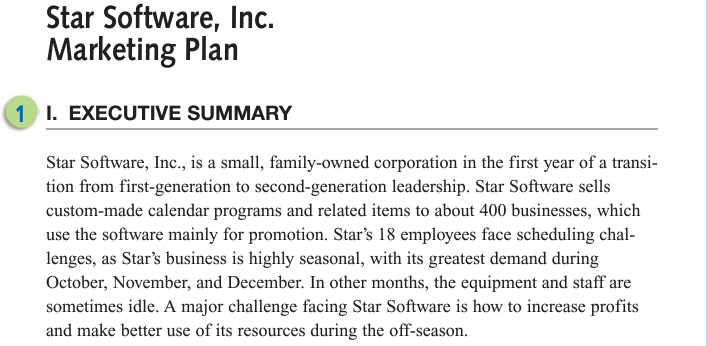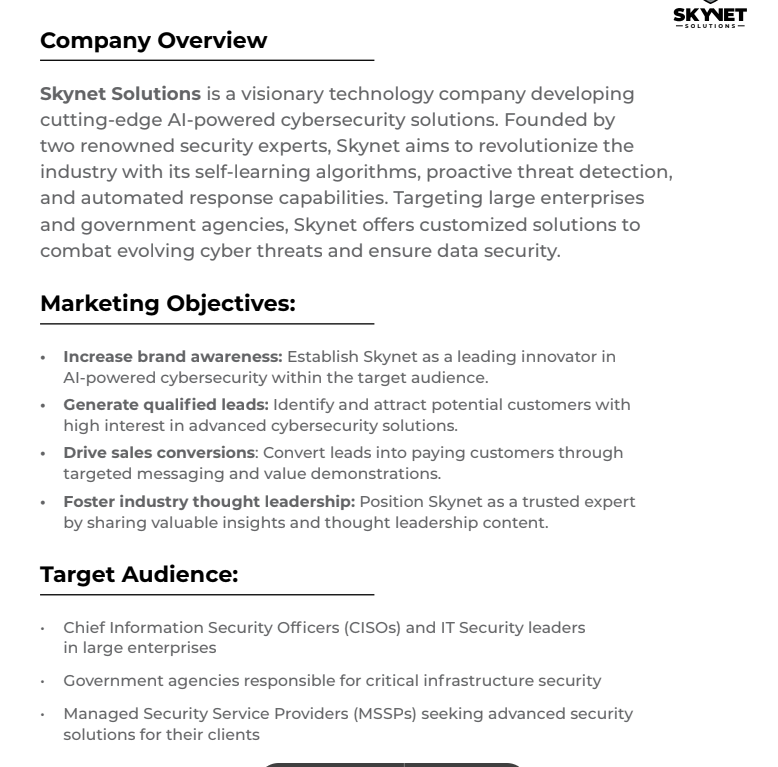Creating a B2B Marketing Plan Using AI (with Prompts)
In this guide, we’ll share sample AI prompts, best practices, and practical tips for busy marketing managers who are looking for efficient ways to build a B2B marketing plan. Plus, our B2B Marketing Plan Generator will draft a great plan for you, instantly and free.
How to Use our B2B Marketing Plan Generator
Just answer a few questions and our AI-powered assistant will generate a draft marketing plan, that you can polish and perfect until you’re thrilled with it. Remember: the more info you provide, the better your marketing plan will get.
Prompts for Improving B2B Marketing Plans
Once you’ve drafted your marketing plan above, you can use these prompts to further refine and improve your plan:
1. To Improve Tone and Style:
“Rewrite this section with a more professional and authoritative tone.”
“Make the content sound more approachable and customer-centric.”
“Inject a touch of creativity while maintaining a serious business tone.”
2. To Reach Target Audience:
“Craft a description of our ideal B2B customers, highlighting their common pain points.”
“Create a persona for a potential client in the (your industry) sector seeking our services.”
3. To Show Your Value:
“Rephrase our unique value proposition to emphasize cost savings and efficiency.”
“Communicate our key differentiator concisely and compellingly.”
4. To Clarify Goals and Objectives:
“Refine our B2B marketing goals for the upcoming year, emphasizing measurable outcomes.”
“Articulate our objectives with a clear focus on lead generation and conversion.”
5. To Conduct Competition Analysis:
“Generate insights on how our competitors are positioning themselves.”
“Craft a comparison chart highlighting our strengths against top industry players.”
6. To Optimize Your Channel:
“Outline a multichannel approach for B2B outreach, prioritizing LinkedIn and industry forums.”
“Suggest new digital platforms where our audience might be active.”
7. To Explore Campaign Ideas:
“Brainstorm innovative campaign concepts to engage B2B clients during peak industry events.”
“Create a series of email marketing subject lines for our upcoming product launch.”
8. To Develop Lead Nurturing Strategies:
“Develop a sequence of follow-up emails for nurturing B2B leads after a webinar.”
“Propose strategies for maintaining long-term relationships with our B2B clients.”
9. To Receive Budget Allocation Guidance:
“Recommend a budget distribution across various B2B marketing initiatives based on ROI projections.”
“Provide a breakdown of expenses for a targeted LinkedIn or other social media channel advertising campaign.”
10. To Visualize Metrics and Analytics:
“Define the key performance indicators (KPIs) we should track to measure B2B marketing success.”
“Create a visual representation of our B2B lead conversion funnel.”
Great Examples of B2B Marketing Plans
Ovum B2B Marketing Plan
 Image Source: Sample.net
Image Source: Sample.net
This Ovum B2B marketing plan is effective because it highlights several key trends and challenges that B2B marketers face today and provides actionable insights and recommendations to help them address them.
Here are some of the key strengths of the plan:
- Emphasizes data-driven decision-making: The plan highlights the need for B2B marketers to collect and analyze data to personalize their marketing efforts and understand their customers better.
- Recognizes the importance of customer experience: The plan emphasizes the need for B2B marketers to focus on creating a seamless and positive customer experience across all channels.
- Provides practical recommendations for B2B marketers: The plan outlines several specific actions that B2B marketers can take to improve their digital marketing efforts, such as investing in marketing platforms, developing a content strategy, and collaborating with other departments.
- Includes research and data: The plan is supported by Ovum’s research on the state of B2B marketing, which makes it more credible and persuasive.
Star Software Marketing Plan
 Image Source: Sample.net
Image Source: Sample.net
This B2B marketing plan for Star Software demonstrates several key strengths that contribute to its effectiveness:
- Robust SWOT analysis: The plan conducts a thorough analysis of the company’s Strengths, Weaknesses, Opportunities, and Threats (SWOT). This helps identify internal advantages and limitations and external opportunities and challenges.
- Clear target market definition: The plan defines specific target markets beyond its current customers. This includes manufacturers, non-manufacturing businesses, consumer product licensing groups, and industry associations.
- Focus on customer needs and satisfaction: The plan emphasizes understanding customer needs and satisfaction through surveys and research. This customer-centric approach helps Star Software develop products and services that resonate with its target audience and build long-term relationships.
- Monitoring and evaluation: The plan outlines procedures for monitoring implementation progress and evaluating the effectiveness of marketing initiatives. This ongoing evaluation allows Star Software to identify areas for improvement and adapt its strategies as needed.
See What You Can Start Building with Our AI Assistant

The example above demonstrates the power of using our Marketing Plan AI assistant is generating a clear, concise marketing plan for your own target audience and objectives. Best of all it takes just seconds to generate and then minutes to edit to your needs. What a time saver!
Best Practices for Creating a B2B Marketing Plan
Here are some best practices to help you create a B2B marketing plan that drives meaningful results and fuels business growth:
- Start with Clear Goals: Your marketing plan lacks a clear direction without well-defined goals. You’ll scatter resources and efforts without a specific target, potentially missing valuable opportunities. Defining goals allows you to set measurable targets for success.
Read here for some effective tips on how to set your marketing goals. - Define Audiences and Segmentation: Go beyond demographics and develop buyer personas highlighting psychographics, motivations, and decision-making processes. Use social listening tools and survey their online behavior and content preferences.
- Outline the Unique Value Proposition (UVP): Don’t just list features. Instead, create a compelling statement that outlines the core benefits you deliver and how it uniquely addresses client challenges. Use concise language and test your UVP with target audiences to ensure it resonates.
- Develop a Multi-channel Strategy: Expand beyond traditional channels and use a mix of digital platforms, such as social media, content marketing, SEO, and email marketing.
- Map a Content Strategy: Focus on value by creating informative and engaging content that educates, solves problems, and showcases your expertise. Use different formats, such as blog posts, case studies, white papers, webinars, and infographics.
- Use Data to Drive Decisions: Data helps you understand your target audience’s behavior, preferences, and pain points. With this information, you can tailor your messaging, content, and channels to resonate with their needs, leading to increased engagement and conversion rates. Google Data Studio provides free, customizable dashboards for data visualization.
- Build Lead Nurturing Funnels: Nurture your leads with personalized emails and educational content tailored to different lead stages. Use lead scoring to prioritize high-value leads and nurture them with relevant information. Encourage engagement and move your leads down the sales funnel. Salesforce Pardot offers a comprehensive lead nurturing guide here.
- Schedule Regular Evaluations: Regularly assess your plan’s performance against your goals and KPIs. Track your campaign results and social media engagement, and adapt your strategy based on these results.
The Media Shower platform lets you draft great marketing plans using our AI assistants, with an award-winning creative team to help you execute on your plan. Click for a free trial.

10 Frequently Asked Questions About B2B Marketing Plan Templates
What is a B2B marketing plan template?
A B2B marketing plan template outlines strategies and tactics to promote your business's products or services to other businesses.
How do I create a B2B marketing plan from scratch?
Start by defining goals, identifying your target B2B audience, crafting a value proposition, selecting marketing channels, and outlining a budget.
What should be included in a B2B marketing plan's executive summary?
The executive summary should describe your B2B market positioning, goals, key strategies, and anticipated outcomes in a concise format.
How do I identify the right B2B target audience?
Research your industry, analyze customer data, and create buyer personas to pinpoint the specific businesses that would benefit from your offerings.
What are some effective B2B marketing channels to consider?
LinkedIn, industry-specific forums, email campaigns, and webinars are popular B2B channels to explore.
How often should I review and adjust my B2B marketing plan?
Regularly review your plan every quarter to assess its performance, adapt to changing market dynamics, and refine strategies.
What metrics should I track in my B2B marketing plan?
Monitor key metrics such as lead generation, conversion rates, customer acquisition cost (CAC), and return on investment (ROI).
How can I differentiate my B2B business in a competitive market?
Focus on your unique value proposition, specialized expertise, exceptional customer service, and case studies showcasing successful outcomes.
What budget considerations are important for a B2B marketing plan?
Allocate your marketing budget based on ROI projections, considering factors like advertising costs, campaign execution, and ongoing optimizations.
Are there B2B marketing plan templates available online?
You can find various B2B marketing plan templates online that can serve as starting points for structuring a plan to suit your business's needs.
10 Protips for B2B Marketing Plans
- Segmentation: Tailor content for well-researched customer segments. Understand your B2B audience’s diverse needs and create customized content accordingly.
- LinkedIn Strategy: Network strategically on LinkedIn. Engage in relevant LinkedIn groups and establish thought leadership to expand your B2B network.
- Content Relevance: Solve challenges with content. Create educational content that addresses specific pain points your B2B clients face.
- Lead Nurturing: Nurture leads with care. Develop a drip email campaign to provide value and maintain engagement with leads.
- Case Studies: Showcase success stories. Highlight how your product/service solved a B2B client’s problem through compelling case studies.
- Competitor Analysis: Learn from competitors. Study your competitors’ successes and failures to refine your B2B marketing strategies.
- Personalization: Personalize B2B communications. Address clients by name and tailor your messages to their industry needs.
- Webinar Engagement: Host interactive webinars. Encourage participants to ask questions and share insights during webinars.
- Analytics Insights: Base decisions on data. Continuously analyze B2B marketing metrics to optimize strategies for better results.
- Feedback Loop: Listen to your clients. Regularly gather feedback from them to adapt and enhance your marketing efforts.
The Media Shower platform lets you draft great marketing plans using our AI assistants, with an award-winning creative team to help you execute on your plan. Click for a free trial.


